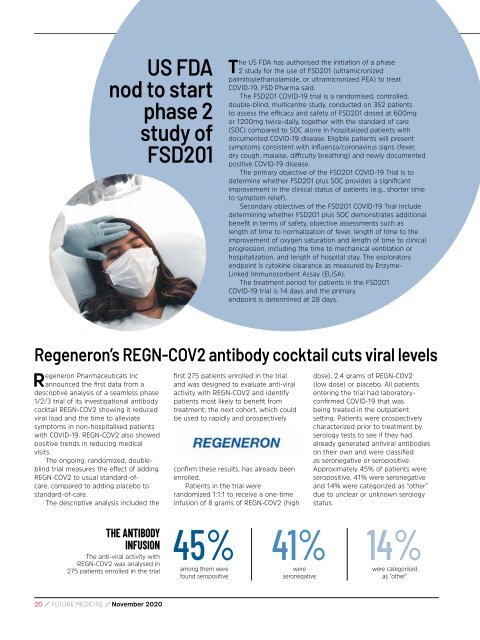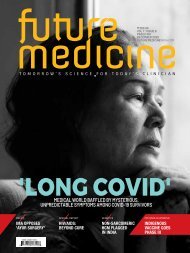FM November2020 Digital P
You also want an ePaper? Increase the reach of your titles
YUMPU automatically turns print PDFs into web optimized ePapers that Google loves.
US FDA<br />
nod to start<br />
phase 2<br />
study of<br />
FSD201<br />
The US FDA has authorised the initiation of a phase<br />
2 study for the use of FSD201 (ultramicronized<br />
palmitoylethanolamide, or ultramicronized PEA) to treat<br />
COVID-19, FSD Pharma said.<br />
The FSD201 COVID-19 trial is a randomised, controlled,<br />
double-blind, multicentre study, conducted on 352 patients<br />
to assess the efficacy and safety of FSD201 dosed at 600mg<br />
or 1200mg twice-daily, together with the standard of care<br />
(SOC) compared to SOC alone in hospitalized patients with<br />
documented COVID-19 disease. Eligible patients will present<br />
symptoms consistent with influenza/coronavirus signs (fever,<br />
dry cough, malaise, difficulty breathing) and newly documented<br />
positive COVID-19 disease.<br />
The primary objective of the FSD201 COVID-19 Trial is to<br />
determine whether FSD201 plus SOC provides a significant<br />
improvement in the clinical status of patients (e.g., shorter time<br />
to symptom relief).<br />
Secondary objectives of the FSD201 COVID-19 Trial include<br />
determining whether FSD201 plus SOC demonstrates additional<br />
benefit in terms of safety, objective assessments such as<br />
length of time to normalization of fever, length of time to the<br />
improvement of oxygen saturation and length of time to clinical<br />
progression, including the time to mechanical ventilation or<br />
hospitalization, and length of hospital stay. The exploratory<br />
endpoint is cytokine clearance as measured by Enzyme-<br />
Linked Immunosorbent Assay (ELISA).<br />
The treatment period for patients in the FSD201<br />
COVID-19 trial is 14 days and the primary<br />
endpoint is determined at 28 days.<br />
Regeneron’s REGN-COV2 antibody cocktail cuts viral levels<br />
Regeneron Pharmaceuticals Inc<br />
announced the first data from a<br />
descriptive analysis of a seamless phase<br />
1/2/3 trial of its investigational antibody<br />
cocktail REGN-COV2 showing it reduced<br />
viral load and the time to alleviate<br />
symptoms in non-hospitalised patients<br />
with COVID-19. REGN-COV2 also showed<br />
positive trends in reducing medical<br />
visits.<br />
The ongoing, randomized, doubleblind<br />
trial measures the effect of adding<br />
REGN-COV2 to usual standard-ofcare,<br />
compared to adding placebo to<br />
standard-of-care.<br />
The descriptive analysis included the<br />
first 275 patients enrolled in the trial<br />
and was designed to evaluate anti-viral<br />
activity with REGN-COV2 and identify<br />
patients most likely to benefit from<br />
treatment; the next cohort, which could<br />
be used to rapidly and prospectively<br />
confirm these results, has already been<br />
enrolled.<br />
Patients in the trial were<br />
randomized 1:1:1 to receive a one-time<br />
infusion of 8 grams of REGN-COV2 (high<br />
dose), 2.4 grams of REGN-COV2<br />
(low dose) or placebo. All patients<br />
entering the trial had laboratoryconfirmed<br />
COVID-19 that was<br />
being treated in the outpatient<br />
setting. Patients were prospectively<br />
characterized prior to treatment by<br />
serology tests to see if they had<br />
already generated antiviral antibodies<br />
on their own and were classified<br />
as seronegative or seropositive.<br />
Approximately 45% of patients were<br />
seropositive, 41% were seronegative<br />
and 14% were categorized as “other”<br />
due to unclear or unknown serology<br />
status.<br />
THE ANTIBODY<br />
The anti-viral activity with<br />
REGN-COV2 was analysed in<br />
275 patients enrolled in the trial<br />
INFUSION<br />
45% 41% 14%<br />
among them were<br />
found seropositive<br />
were<br />
seronegative<br />
were categorised<br />
as "other"<br />
20 / FUTURE MEDICINE / November 2020

















